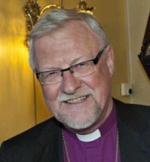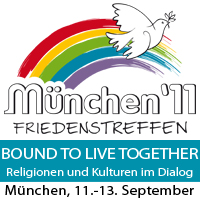
Lutherischer Bischof, Norwegen
|
In the Christian tradition we often speak of the “love-ethics” of Jesus and in Christian living and refer “justice” to the realm of politics and public morality. But is this the way the Bible deals with justice and love? And can our dialogue across different religious traditions open our eyes to concerns that we need to see?
The biblical context
Recently I read about a group of students who decided to study every reference in the Bible on one specific topic: the poor and the oppressed. One of the students did it his own way. He found an old Bible, took a pair of scissors and proceeded to cut out every passage relating to the poor. By the time he finished, the old Bible was not only full of holes. It fell apart in his hands.
When I begin with this example of a rather extraordinary way to study the Bible, it is to make one basic point: The Word of God always comes to us in a context, and its context for speaking about “Justice and Love” has to do with the poor and the oppressed.
One example of this is found in chapter 61 in the book of Isaiah. The prophet speaks to a people which has suffered in exile and seen their towns and villages ruined. Now he says that he has been anointed by the Lord to bind up the broken-hearted, to proclaim good news to the poor, freedom for captives and release for prisoners, and then he refers to the word of God to the people: “For I, the Lord, love justice.”
When Jesus begins his public ministry, he quotes the words of Isaiah 61. He is back in his hometown Nazareth and speaks to his people there. Now it is Jesus who says that the Spirit of the Lord is upon him, and that he is anointed to preach good news to the poor, to proclaim freedom for the oppressed and the outcast, and to give sight to the blind. With these words he defines his ministry and points to the road that is ahead of him and those who want to follow him.
Justice in the Bible
In contemporary society we speak about justice as “every person getting what is due to him or her”. But what is due to each and every person or group of individuals is a point of constant tension. The Bible has a somewhat different emphasis. Justice in the Bible is more than anything relational, it concerns our relations to one another.
Hebrew has two basic words for justice, two words that we translate with “justice”. Tsedaqa has to do with our dependence upon one another, our relational interdependence, and it focuses particularly on our attentiveness to the needs of the other. Mishpat is about restoring the lives and the relations for those who have been wronged. It is this last word God uses when Isaiah has spoken about good news for the poor and freedom for the oppressed: “For I, the Lord, love justice.”
This biblical perspective on justice challenges me, it challenges the way we practice justice in our lives and in our societies. It focuses my attention upon our dependence of one another, upon fidelity to this interdependence and particularly our willingness to restore those who have been wronged. How do we – as individuals, families and communities – deal with each other and the most vulnerable in our societies? It also concerns our relationship to God.
Love, forgiveness and restoration
This then takes us from the biblical witness about “the God of Justice” to its testimony about “the Love of God”. God is concerned with the poor and the oppressed, with those who have been wronged. He is also concerned with the wrongdoers. He wants to restore our relations and our interdependence, but he begins with our relationship to himself.
The love of God is his compassion to forgive sinners, to forgive us our sins. The prophet Hosea speaks to a people who have gone astray in their relation to God and his commandments, in their relations to one another. But God says: “All my compassion is aroused. I will not carry out my fierce anger... For I am God, and not man – the Holy One among you.” Thus we say: To err is human, to forgive is divine.
But we often speak in such abstract terms of sin and forgiveness, about grace and justification, that we forget and don’t see those who are victims of our trespasses. Sometimes we do this in such a way that we put the burden on those who have been wronged, instead of letting our prayer for God’s forgiveness lead to a restoration of our broken relations.
Sacrifice and friendship
The New Testament has two words for love. The most distinct is Agape – sacrificial love. This love is epitomized in the sacrifice of Christ on the cross to atone for our sins and reconcile us with God. On the cross the Justice of God becomes compassion, a sacrificial love that carries all injustice – for the victims, for the wrongdoers and for the sake of our lives in community with one another. The resurrection of Christ then becomes for us the seed of a new humanity, the gift of restoring our lives and relations - a new path in search of a just society and in the daily practice of sacrificial love.
But the New Testament also uses another love-word. Filia is often used as a synonym to agape, but carries more distinctly the notion of love between friends, the love of friendship. Jesus uses this word in his final conversation with Peter after the resurrection: “Do you love me – do you care for me as my friend?” This is the concern of the Lord who identifies with the poor and the prisoners, the sick and the strangers, the hungry and the thirsty.
I started out by pointing to the context in which the Bible speaks about “Justice and Love”: the context of God’s concern for the poor and the oppressed. I want to end on the same note, but then with a reference to our present context in this conference. The love of friendship is at the heart of Sant’ Egidio, and we appreciate their emphasis: friendship with the poor. But I have also noted that they not primarily speak of the poor and the prisoners, the strangers and the sick as such, but always as friends. This is not only their way of speaking, it is what they live, and in this way they show us the path to restore relationships and our interdependence – through the love of friendship.
So in conclusion: Love in the biblical Scriptures goes beyond justice, but it can never seek less than justice. Justice in the biblical sense includes the rights of every individual created in the image of God, but its emphasis is relational, upon restoring our broken relations – with God and with one another. In our Christian Scriptures sacrificial love and friendship is then the road to achieve this restoration, as well as its continuation – to live and practice our interdependence, our continued attentiveness to the needs of the other.
To me this is one of the biblical contributions to the vision of a just society with space for love and friendship to unfold. Today this is also my contribution to our common search for a deeper understanding of “Justice and Love”, how we are bound together and called to live together.
|

